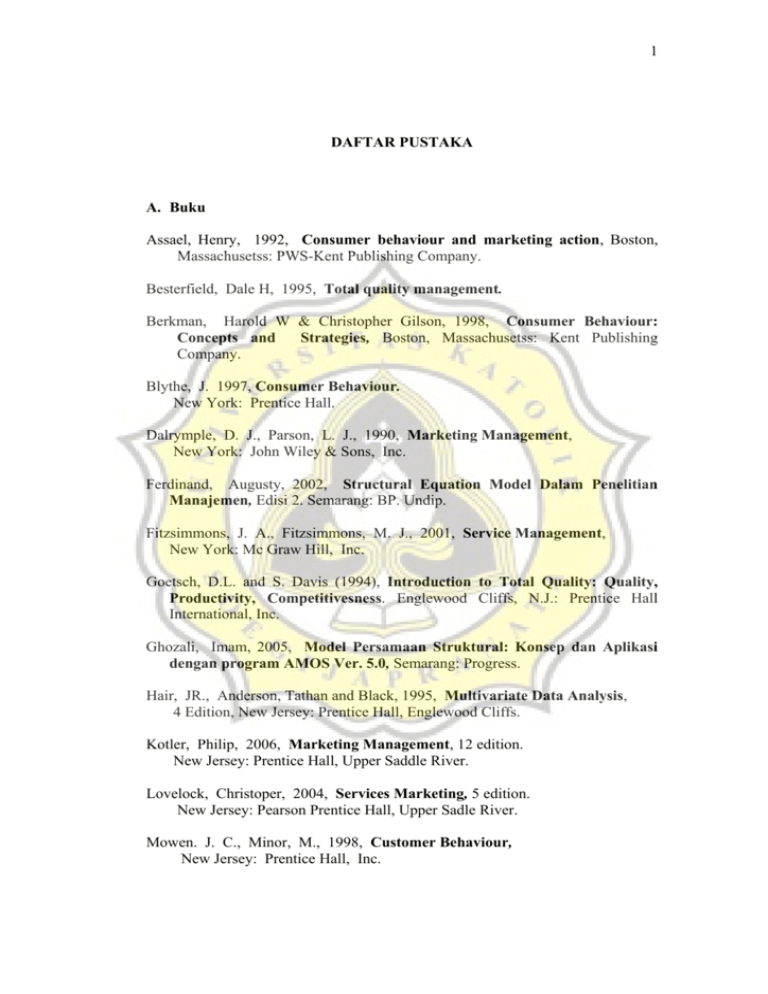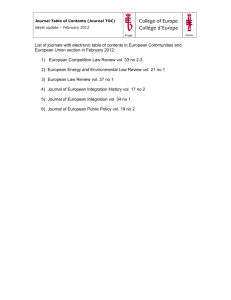
1
DAFTAR PUSTAKA
A. Buku
Assael, Henry, 1992, Consumer behaviour and marketing action, Boston,
Massachusetss: PWS-Kent Publishing Company.
Besterfield, Dale H, 1995, Total quality management.
Berkman, Harold W & Christopher Gilson, 1998, Consumer Behaviour:
Concepts and
Strategies, Boston, Massachusetss: Kent Publishing
Company.
Blythe, J. 1997, Consumer Behaviour.
New York: Prentice Hall.
Dalrymple, D. J., Parson, L. J., 1990, Marketing Management,
New York: John Wiley & Sons, Inc.
Ferdinand, Augusty, 2002, Structural Equation Model Dalam Penelitian
Manajemen, Edisi 2. Semarang: BP. Undip.
Fitzsimmons, J. A., Fitzsimmons, M. J., 2001, Service Management,
New York: Mc Graw Hill, Inc.
Goetsch, D.L. and S. Davis (1994), Introduction to Total Quality: Quality,
Productivity, Competitivesness. Englewood Cliffs, N.J.: Prentice Hall
International, Inc.
Ghozali, Imam, 2005, Model Persamaan Struktural: Konsep dan Aplikasi
dengan program AMOS Ver. 5.0, Semarang: Progress.
Hair, JR., Anderson, Tathan and Black, 1995, Multivariate Data Analysis,
4 Edition, New Jersey: Prentice Hall, Englewood Cliffs.
Kotler, Philip, 2006, Marketing Management, 12 edition.
New Jersey: Prentice Hall, Upper Saddle River.
Lovelock, Christoper, 2004, Services Marketing, 5 edition.
New Jersey: Pearson Prentice Hall, Upper Sadle River.
Mowen. J. C., Minor, M., 1998, Customer Behaviour,
New Jersey: Prentice Hall, Inc.
2
Rangkuti, Freddy, 2006, Measuring Customer Satisfaction.
Jakarta: Gramedia Pustaka Utama.
Payne, Adrian, 2000, Adrian, 2000, The Essence of Service Marketing.
Yogyakarta: Andi.
Stanton, William. J. Etzel, Bruce J. Walker et al. 1991. Fundamentals of
Marketing. McGraw-Hill Inc., Singapore.
Simamora, Bilson, 2001, Remarketing for Business Recovery, Edisi 1.
Jakarta: PT. Gramedia Pustaka Utama.
Sutisna, 2003, Perilaku Konsumen dan Komunikasi Pemasaran.
P.T. Rosda Karya Bandung.
Singarimbun, Masri dan Sofian Effendi. Metode penelitian Survei.
Jakarta: LP3ES, 1989.
Supranto J., 2001, Pengukuran Tingkat Kepuasan Pelanggan. Edisi 2.
Jakarta: Rineka Cipta.
Tjiptono, Fandy, 1998, Total Quality Service. Edisi 2.
Yogyakarta: Andi.
Zeithaml, V. A., Bitner, M. J., 2003, Service Marketing,
New York: The Mc Graw-Hill Companies, Inc.
3
B. Jurnal
Anderson, E.W. and Fornell, C., 1994, “A customer satisfaction research
prospectus”, in Rust, R.T. and Oliver, R.L. (Eds), Service Quality. New
Directions in Theory and Practice, pp. 241-68.
Anderson, E.W. and Fornell, C. and Lehmann, D.R.,1994, “Customer satisfaction,
market share and profitability”, Journal of Marketing., Vol. 58. No. 3, pp. 5366.
Asubonteng, P., Mc Clearly, K.J. and Swan, J.E., 1999, “SERVQUAL revisited: a
critical review of service quality”, The Journal of Services Marketing, vol. 10,
no. 6, p. 62-81.
Athanassopoulus, A., Spiros G. and Vlassis S., 2001, “Behavioral responses to
customer satisfaction: an empirical study”, European Journal of Marketing,
vol. 35, no. 5/6, p. 687-707.
Bitner, M.J., 1990, “Evaluating service encounters: the effects of physical
surroundings and employee responses”, Journal of Marketing, vol. 54, April,
pp. 69-82.
Bitner, M.J., Booms, B.H. and Mohr, L.A., 1994, “Critical service encounters:
the employees viewpoint”, Journal of Marketing, vol. 58 No. 4, pp. 95-106.
Bloemer J.M.M. and Kasper, H.D.P., 1995, “The complex relationship between
consumer satisfaction and brand loyalty”, Journal of Economic Psychology,
Vol. 16, p. 311-29.
Cronin. J.J. Jr. and Taylor, S.A., 1992, “Measuring service quality: e
reexamination and extension”, Journal of Marketing, vol. 56/3, July, pp. 5568.
Cronin. J.J. Jr. and Taylor, S.A., 1994, “SERVPERF versus SERVQUAL:
reconciling performance-based and perceptions-minus-expectations
measurement of service quality”, Journal of Marketing, vol. 58, pp. 125-131.
Dabholkar, P.A., Thorpe, D.I. and Rentz, J.O., 1996, “A measure of service
quality for retail stores: scale development and validation”, Journal of the
Academy of Marketing Science, vol. 24 No. 1, pp. 3-16.
Danaher, P.J. and Rust, R.T., 1994, “Indirect marketing benefits from service
quality”, Working paper, Owen Graduate School of Management, Vanderbilt
University, Nashville, TN.
4
Day, G.S., 1994, “The capabilities of market-driven organizations”, Journal of
Marketing, Vol. 58 No. 4, pp. 37-52.
Dick, A.S. and Basu, K., 1994, “Customer loyalty: toward an integrated
conceptual framework”, Journal of the Academy of Marketing Science, Vol.
22 No. 2, pp. 99-113.
Fornell, C., 1992, “A national customer satisfaction barometer: the Swedish
experience”, journal of Marketing, Vol. 56, pp. 1-18.
Fornell, C., Johnson, M.D., Anderson, E.W., Cha, J. and Bryant, B.E., 1996, “The
American customer satisfaction index: nature, purpose and findings”,
Journal of Marketing, Vol. 60, October, pp. 7-18.
Iacobucci, D., Ostrom, A. and Grayson, K., 1995, “Distinguishing service quality
and customer satisfaction: the voice of the consumers”, Journal of Consumer
Psychology, vol. 4 No. 3, pp. 277-303.
Jones, T.O. and Sasser, W.E., 1995, “Why satisfied customers defect”, Harvard
Business Review, November-Desember, pp. 88-99.
Mittal, B. and Lassar, W.M., 1998, “Why do customers switch? The dynamics of
satisfaction versus loyalty”, The Journal of Services Marketing, vol. 12 no.3 p.
177-194.
Oliver, R., 1997, Satisfaction: “A Behavioral Perspective of the Consumer”,
McGraw-Hill, New York, NY.
Oliver, R.L., 1999, “Whence consumer loyalty?”, Journal of Marketing, vol 63, p.
33.
Parasuraman, A., Zeithaml, V.A. and Berry, L.L., 1988, “Servqual: a multipleitem scale for measuring consumer perceptions of service quality”, journal
of Retailing, Vol. 64, Spring, pp. 12-40.
Parasuraman, A., Zeithaml, V.A. and Berry, L.L., 1991, “Refining and
reassessment of Servqual scale”, journal of Retailing, Vol. 67, Winter, pp.
420-50.
Passikoff, R., 1997, “The limits of costumer satisfaction”, Brandweek, vol. 38
No. 9, p. 17.
Quester, P., Wilkinson, J.W. and Romaniuk, S., 1995, “A test of four service
quality measurement scales: the case of the Australian advertising industry”,
Working Paper 39, Centre de Recherche et d’Etudes Appliquees, Group esc
Nantes Atlantique, Graduate School of Management, Nantes, France.
5
Robinson, S., 1999, “Measuring service quality: current thinking and future
requirements”, Marketing Intelligence and Planning, vol. 17, no. 1, pp. 21-32.
Reichheld, F.F. and Sasser, W.E. Jr., 1990, “Zero defections: quality comes to
services”, Harvard Business Review, vol. 68, pp. 105-11.
Rust, R.T. and Oliver, R.L., 1994, “Service quality: insights and managerial
implications from the frontier”, in Rust, R.T. and Oliver, R.L. (Eds), Service
Quality: New Directions in Theory and Practice, pp. 241-68.
Rust, R.T. and Williams, D.C., 1994, “How length of patronage affects the
impact of costumer satisfaction on repurchase intention”, Journal of
Customer Satisfaction, Dissatisfaction and Complaining Behaviour, Vol. 7,
pp. 107-13.
Sureshchandar, G.S, Rajendran, C. Anantharaman R.N., 2002, “The relationship
between service quality and customer satisfaction – a factor specific
approach”. Journal of Service Marketing, vol. 16 no. 4, p. 353-379.
Swan, J.E. and M.R. Bowers, 1998, “Services quality and satisfaction: the
process of people doing things together”, Journal of Services Marketing, vol
12, No. 1, pp. 59-72.
Solomon, M.R., 1996, “Consumer Behavior: Buying, Having, Being”, PrenticeHall, Englewood Cliffs, NJ.
Zeithaml, V.A., Berry, L.L., and Parasuraman, A., 1996, “The behavioral
consequences of service quality”, Journal of Marketing, vol. 60, pp. 31-46.
Sivadas, Eugene & Jami L Baker-Prewitt., 2000. An Examination of the
Relationship Between Service Quality, Customer Satisfaction, and Store
loyalty. International Journal of Retail & Distribution Management, Volume
28 · Number 2 · 2000 · pp. 73 – 82.
Chezy Offir and Itamar Simonson. 2005. The Effect of Stating Expectations
on Customer Satisfaction and Shopping Experience. Research paper No.
1881. Stanford, Graduate School of Business.
Rajagopal. 2005. Measuring Customer Value and Market Dynamics for New
Products of a Firm: An Analytical Construct for Gaining Competitive
Advantage. Working Paper 01/ 2005, JEL Classification B 41, C13, C44,
C 51, D11, m21, M31. Departement of Marketing Business Division,
Monterrey Institute of Technology and Higher Education, Mexico City
Campus, Mexico DF 14380.
6
Rajagopal. 2006. Leisure Shopping Behaviour and Recreational Retailling: A
Symbiotic Analysis of Marketplace Strategy and Consumer Response.
Working Paper 06/2006, JEL Codes: C51, C91, D12, M31.
Mexico City Campus, Mexico DF 14380.
Verhoef, Peter C, 2002. The Joint Effect of Relationship Perceptions, Loyalty
Program and Direct Mailings on Customer Share Development. ERIM
Report Series Research In Management, Number of pages 54, Erasmus
Research Institute of Management.





